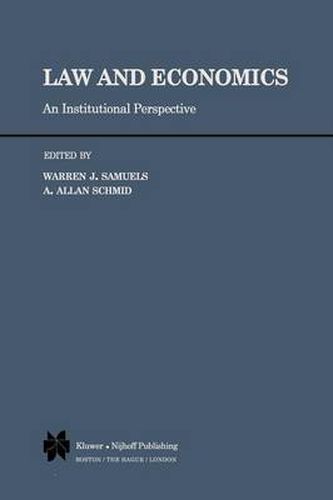Readings Newsletter
Become a Readings Member to make your shopping experience even easier.
Sign in or sign up for free!
You’re not far away from qualifying for FREE standard shipping within Australia
You’ve qualified for FREE standard shipping within Australia
The cart is loading…






This title is printed to order. This book may have been self-published. If so, we cannot guarantee the quality of the content. In the main most books will have gone through the editing process however some may not. We therefore suggest that you be aware of this before ordering this book. If in doubt check either the author or publisher’s details as we are unable to accept any returns unless they are faulty. Please contact us if you have any questions.
This book brings together a number of articles, for the most part already pub lished, that develop a contemporary institutionalist approach to the study of the economic role of government. The institutionalist tradition in these matters began with the work of Henry Carter Adams on economics and jurisprudence! and Richard T. Ely on the relation of the institutions of property and contract 2 to the distribution of wealth. It continued with John R. Commons’s monu 3 mental analytical and historical study of the legal foundations of capitalism, Edwin E. Witte’s work on the role of government in the economy,4 and Ken s neth Parson’s study of economic developmenL The approach to law and economics that is developed in this book centers on (1) an identification of the objective fundamentals of the interrelations between legal and economic pro* cesses and (2) the development of skills with which to analyze and predict the performance consequences of alternative institutional designs. We must stress that our principal goal is quite simply to understand what is going on-to identify the instrumental variables and fundamental issues and processes-in the operation of legal institutions of economic significance. We envision government as an object of legal control. We also see law as an instrument of securing economic gain and advantage-that is, as a wealth producing and -acquiring alternative.
$9.00 standard shipping within Australia
FREE standard shipping within Australia for orders over $100.00
Express & International shipping calculated at checkout
This title is printed to order. This book may have been self-published. If so, we cannot guarantee the quality of the content. In the main most books will have gone through the editing process however some may not. We therefore suggest that you be aware of this before ordering this book. If in doubt check either the author or publisher’s details as we are unable to accept any returns unless they are faulty. Please contact us if you have any questions.
This book brings together a number of articles, for the most part already pub lished, that develop a contemporary institutionalist approach to the study of the economic role of government. The institutionalist tradition in these matters began with the work of Henry Carter Adams on economics and jurisprudence! and Richard T. Ely on the relation of the institutions of property and contract 2 to the distribution of wealth. It continued with John R. Commons’s monu 3 mental analytical and historical study of the legal foundations of capitalism, Edwin E. Witte’s work on the role of government in the economy,4 and Ken s neth Parson’s study of economic developmenL The approach to law and economics that is developed in this book centers on (1) an identification of the objective fundamentals of the interrelations between legal and economic pro* cesses and (2) the development of skills with which to analyze and predict the performance consequences of alternative institutional designs. We must stress that our principal goal is quite simply to understand what is going on-to identify the instrumental variables and fundamental issues and processes-in the operation of legal institutions of economic significance. We envision government as an object of legal control. We also see law as an instrument of securing economic gain and advantage-that is, as a wealth producing and -acquiring alternative.